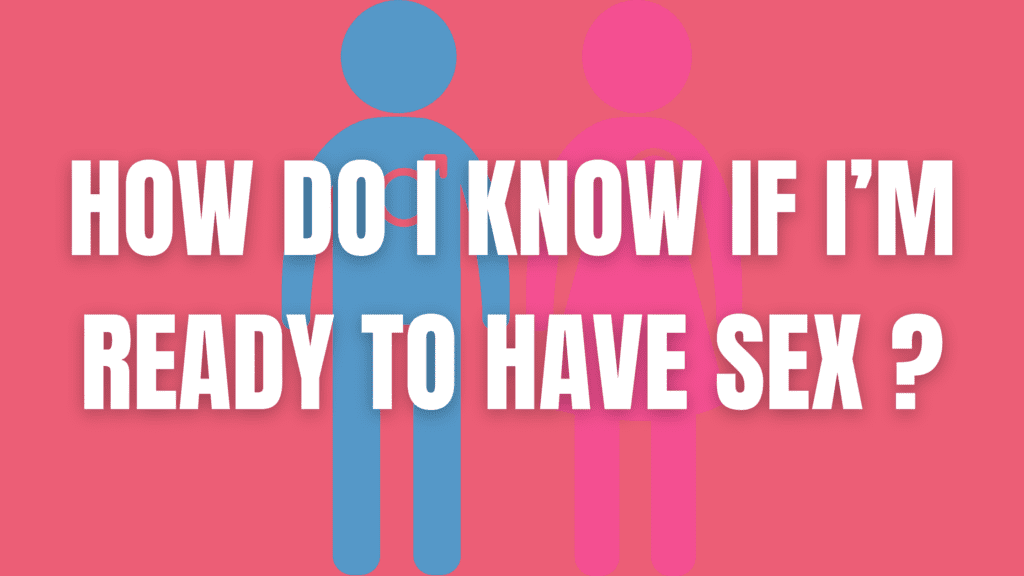Deciding to have sex is a deeply personal decision, and there’s no universal answer to when someone is “ready.” It’s about understanding your emotions, values, and circumstances while feeling comfortable and confident in your choice. This blog will walk you through everything you need to consider to determine if you’re ready to have sex.
What Does “Being Ready” Mean?
Being ready for sex doesn’t just mean feeling physically attracted to someone. It involves emotional readiness, mutual respect, understanding the consequences, and ensuring you’re in a safe and consensual situation.
Questions to Ask Yourself
Before deciding, reflect on these questions:
- Why Do I Want to Have Sex?
- Is it because you genuinely want to, or are you feeling pressured by your partner, peers, or societal expectations?
- Healthy reasons might include feeling a deep connection with your partner or wanting to explore intimacy on your terms.
- Am I Comfortable With My Partner?
- Do you trust your partner, and do they respect your boundaries?
- Open communication is essential. If you can’t discuss topics like consent, protection, or expectations, you may not be ready.
- Do I Understand the Risks?
- Are you aware of the potential risks, like STIs, pregnancy, or emotional impact?
- Have you considered how to protect yourself with condoms and other forms of contraception?
- How Will I Feel Afterward?
- Consider how you might feel emotionally. Are you ready to handle the feelings or possible changes in your relationship that may follow?
- Consider how you might feel emotionally. Are you ready to handle the feelings or possible changes in your relationship that may follow?
- Is This Aligned With My Values?
- Does having sex align with your personal beliefs, cultural or religious values, or moral compass?
Signs You Might Be Ready
Here are some indicators that you may be ready to take this step:
- You Feel Confident in Your Decision:
- You’re not feeling pressured or unsure. Instead, you feel calm and positive about your choice.
- You’re not feeling pressured or unsure. Instead, you feel calm and positive about your choice.
- You Can Communicate Openly:
- You and your partner can discuss boundaries, desires, and protection without fear or discomfort.
- You and your partner can discuss boundaries, desires, and protection without fear or discomfort.
- You’ve Educated Yourself:
- You understand how to protect yourself from STIs and unwanted pregnancies.
- You know where to access birth control and how to use condoms correctly.
- You Trust Your Partner:
- Your partner listens to you, respects your boundaries, and doesn’t pressure you into anything you’re uncomfortable with.
- Your partner listens to you, respects your boundaries, and doesn’t pressure you into anything you’re uncomfortable with.
- You’re Emotionally Ready:
- You feel emotionally stable and capable of handling any outcomes, whether it’s changes in your relationship or dealing with unexpected feelings afterward.
What If You’re Not Sure?
It’s okay to feel uncertain! Many people feel conflicted about their first sexual experience. If you’re unsure, here are some tips:
- Take Your Time:
There’s no rush. Waiting until you’re fully ready is always the best choice. - Talk to Someone You Trust:
Speak with a trusted friend, family member, or a counselor about your feelings. - Educate Yourself:
Learn about sexual health, consent, and relationships to help you make an informed decision. - Focus on Your Comfort Level:
If something feels off or rushed, it’s a sign to wait. Your comfort is a top priority.
The Role of Consent
Consent is a non-negotiable aspect of readiness. Here’s what consent looks like:
- It’s enthusiastic: Both partners actively want to engage in the experience.
- It’s verbal: Phrases like “Yes, I want this” confirm consent.
- It’s ongoing: Consent can be withdrawn at any time, even during the act.
- It’s mutual: Both partners must agree willingly, without any form of pressure or manipulation.
Tips for a Positive Experience
If you feel ready to take this step, here are some ways to ensure it’s a positive and safe experience:
- Use Protection:
Always use condoms to protect against STIs and unintended pregnancies. Consider combining them with another form of birth control for added safety. - Communicate With Your Partner:
Discuss expectations, boundaries, and preferences before and during the experience. - Choose the Right Setting:
Ensure you’re in a comfortable, private, and safe environment where you won’t feel rushed or distracted. - Set Boundaries:
Be clear about what you’re comfortable with and ensure your partner respects your limits. - Focus on Emotional Connection:
If you’re with someone you trust and care for, the experience is likely to feel more meaningful and satisfying.
Myths About Readiness
Let’s clear up some common misconceptions about being ready for sex:
- “Everyone’s Doing It”:
The truth is, everyone moves at their own pace. There’s no “right” age or timeline for becoming sexually active. - “It’s Just Physical”:
Sex often comes with emotional consequences. Feeling emotionally connected and secure is key. - “If I Love Them, I Should Be Ready”:
Love is important, but it doesn’t automatically mean you’re ready. Take the time to ensure it’s the right decision for you.
Final Thoughts
Deciding to have sex is a personal and significant choice that should always prioritize your comfort, safety, and emotional well-being. It’s not about meeting someone else’s expectations but about listening to yourself and making an informed, confident decision.
If you’re still unsure, remember, it’s okay to wait. You deserve a positive and meaningful experience, and that starts with feeling truly ready.

